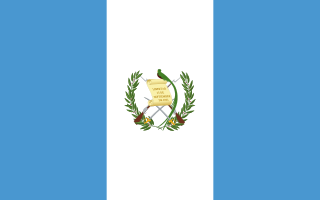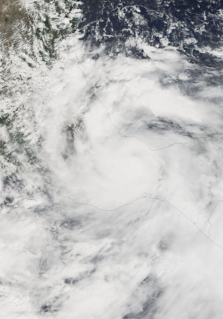Related Research Articles

The economy of Guatemala is a considered a developing economy, highly dependent on agriculture, particularly on traditional crops such as coffee, sugar, and bananas. Guatemala's GDP per capita is roughly one-third of Brazil's. The Guatemalan economy is the largest in Central America. It grew 3.3 percent on average from 2015 to 2018. However, Guatemala remains one of the poorest countries in Latin America and the Caribbean, having highly unequal incomes and chronically malnourished children. The country is beset by political insecurity, and lacks skilled workers and infrastructure. It depends on remittances for nearly one-tenth of the GDP.

The Maya peoples are an ethnolinguistic group of indigenous peoples of Mesoamerica. The ancient Maya civilization was formed by members of this group, and today's Maya are generally descended from people who lived within that historical civilization. Today they inhabit southern Mexico, Guatemala, Belize, El Salvador and Honduras. "Maya" is a modern collective term for the peoples of the region, however, the term was not historically used by the indigenous populations themselves. There was no common sense of identity or political unity among the distinct populations, societies and ethnic groups because they each had their own particular traditions, cultures and historical identity.

The Philanthropy Roundtable is a nonprofit organization that advises conservative philanthropists.

Guatemalans are people connected to the country of Guatemala. This connection may be residential, legal, historical or cultural. For most Guatemalans, several of these connections exist.

Lake Atitlán is a lake in the Guatemalan Highlands of the Sierra Madre mountain range. It is in the Sololá Department of southwestern Guatemala. It is the deepest lake in Central America.
Mayan Sign Language is a sign language used in Mexico and Guatemala by Mayan communities with unusually high numbers of deaf inhabitants. In some instances, both hearing and deaf members of a village may use the sign language. It is unrelated to the national sign languages of Mexico and Guatemala, as well as to the local spoken Mayan languages and Spanish.

Hurricane Stan was a relatively weak but deadly tropical cyclone that affected areas of Central America and Mexico in early October 2005. The eighteenth named storm and eleventh hurricane of the 2005 Atlantic hurricane season, Stan formed from a tropical wave on October 1 after it had moved into the western Caribbean. The depression slowly intensified, and reached tropical storm intensity the following day, before subsequently making its first landfall on the Yucatán Peninsula. While traversing the peninsula, the tropical storm weakened, but was able to re-intensify once it entered the Bay of Campeche. Under favorable conditions for tropical development, Stan attained hurricane strength on October 4, and later reached peak intensity with winds of 80 mph (130 km/h) and a minimum barometric pressure of 977 mbar. The hurricane maintained this intensity until landfall near Punta Roca Partida, Mexico later the same day. Once over the mountainous terrain of Mexico, however, Stan quickly weakened, and dissipated on October 5.
The World Barista Championship (WBC) is an annual barista competition operated by World Coffee Events for the title of World Barista Champion. The competition is composed of the winners of the national barista championships, which are operated by the Specialty Coffee Association (SCA) chapters, or an approved, independent, non-profit national body.
Awakatek is a Mayan language spoken in Guatemala, primarily in Huehuetenango and around Aguacatán. The language only has fewer than 10,000 speakers, and is considered vulnerable by UNESCO. In addition, the language in Mexico is at high risk of endangerment, with fewer than 2,000 speakers in the state of Campeche in 2010.

Richard D. Hansen is an American archaeologist who is an adjunct professor of anthropology at the University of Utah

Guatemala, officially the Republic of Guatemala, is a country in Central America, bordered by Mexico to the north and west, Belize and the Caribbean to the northeast, Honduras to the east, El Salvador to the southeast and the Pacific Ocean to the south. With an estimated population of around 17.2 million, it is the most populous country in Central America and is the 11th most populous country in the Americas. Guatemala is a representative democracy; its capital and largest city is Nueva Guatemala de la Asunción, also known as Guatemala City, the largest city in Central America.
Specialty coffee is a term for the highest grade of coffee available, typically relating to the entire supply chain, using single origin or single estate coffee. The term was first used in 1974 by Erna Knutsen in an issue of Tea & Coffee Trade Journal. Knutsen used specialty coffee to describe beans of the best flavor which are produced in special micro-climates.
Candid is an information service specializing in reporting on U.S. nonprofit companies. In 2016, its database provided information on 2.5 million organizations. It is the product of the February 2019 merger of GuideStar with Foundation Center.

Xen Coffee is an independent siphon coffee bar in Hong Kong. Xen Coffee's first coffee shop was in Quarry Bay. Xen Coffee serves highly selective coffee varieties from Africa, Indonesia, Central and South Americas. Xen Coffee was awarded Best Fair Trade Cafe in Hong Kong for its effort as a pioneer in promoting Fair Trade products like chocolate from Ghana, organic coffee from Ethiopian Yirgacheffe and the rainforest of Guatemala in Hong Kong. Time Out magazine has selected Xen Coffee as one of Hong Kong's 20 Best Coffee Spots. Xen Coffee has also been covered in My Coffee Guide written by Moses Chan, a coffee geek and celebrity in Hong Kong. Helen Chow, the head Siphonist of Xen Coffee was awarded the title of World Siphonist by the Specialty Coffee Association of Japan (SCAJ) to honor her achievement as second runner-up in the World Siphonist Championship (WSC) 2010. The founder of Xen Coffee, Dixon Ip, is the first person in China to obtain certifications from both the Specialty Coffee Association of America (SCAA) and Coffee Quality Institute (CQI) as SCAA Cupping Judge and CQI Licensed Q Grader. Xen Coffee focuses on educating the local community on coffee beyond espresso and promoting the concept of enjoying specialty coffee from single origins.
Third wave coffee is a movement in coffee marketing emphasizing high quality. Beans are typically sourced from individual farms and are roasted more lightly to bring out their distinctive flavors. Though the term was coined in 1999, the approach originates in the 1970s, with roasters such as the Coffee Connection.
The Guatemala Health Initiative (GHI) is a private, humanitarian organization that works to improve the health of the impoverished, indigenous population in the remote areas of the Western highlands in Guatemala. It is affiliated with the University of Pennsylvania. Faculty, students, and staff, work in partnership to address the health issues of the underprivileged Santiago Atitlán community in Guatemala. The goal of GHI is to strengthen clinical services and promote community health in resource-poor Guatemalan communities.
The Pan-Mayan Movement is an ethno-political movement among the Maya peoples of Guatemala and Mexico. The movement emerged in the late 1980s and early 1990s in response to a long tradition of the political marginalization of the large indigenous population of Guatemala, and particularly in response to the violent counter-insurgency policies that disproportionately affected indigenous communities during the Guatemalan Civil War. The movement was organized around an ideology seeking to unite the speakers of Guatemala's many Mayan languages under a single shared cultural/ethnic identity. It was an alternative to either of the parties of the civil war - the communist revolutionaries and the conservative government. Indigenous Mayan linguists trained by North American linguists in the Proyecto linguistico Francisco Marroquin played a major role in organizing the movement. With the 1996 peace accords the movement gained a significant position in Guatemalan politics.
Agua del Pueblo (AdP) is a private, non-profit, non-denominational and Guatemalan organization. AdP has completed more than 900 integrated rural water, sanitation and community development projects serving more than 500,000 Guatemalan citizens. AdP is the oldest non governmental organization focused on rural water supply and sanitation in the world.
The Mayan community makes up 51% of the population of Guatemala. Despite their majority, the indigenous Mayan peoples have a history of oppression in Guatemala which is reported to still continue presently.
References
- ↑ Smith-Spark, Laura (2005-10-23). "Hospital hope for mudslide town". BBC News. Retrieved 2013-11-13.
- ↑ Smith Spark, Laura (2006-10-05). "Painful legacy of Guatemala storm". BBC News. Retrieved 2013-11-13.
- 1 2 Hendrix, Steve (2005-10-23). "Washington Post Foreign Correspondent". Washington Post. Retrieved 2013-11-13.
- 1 2 3 "CoffeeTalk Magazine – July 2013 – Making a Difference". Coffeetalk.uberflip.com. Archived from the original on 2013-10-19. Retrieved 2013-11-15.
- ↑ "2013 Sustainability Award Selection Process | The Specialty Coffee Chronicle". Scaa.org. 2013-07-08. Retrieved 2013-11-15.
- ↑ "Daily Coffee News by Roast Magazine – Group Promoting Farming in Guatemala Honored by SCAA". Dailycoffeenews.com. 2013-02-18. Retrieved 2013-11-15.
- ↑ "Fresh Cup – OCT 2013". Freshcup.epubxp.com. Archived from the original on 2013-10-11. Retrieved 2013-11-15.
- ↑ "CoffeeTalk Magazine – July 2012 – Making a Difference". Coffeetalk.uberflip.com. Archived from the original on 2014-01-14. Retrieved 2013-11-15.
- ↑ http://www.scaa.org/chronicle/2013/12/30/investing-in-people/
- ↑ LindaConard has written 11 posts on this blog. (2013-05-01). "A strong start for new moms – Qué Pasa Magazine". Grupoquepasa.com. Retrieved 2013-11-15.
- ↑ "Announcing: the CFP Class of 2012–13 | Catalogue for Philanthropy: Greater Washington". Blog.cfp-dc.org. 2012-06-04. Retrieved 2013-11-15.